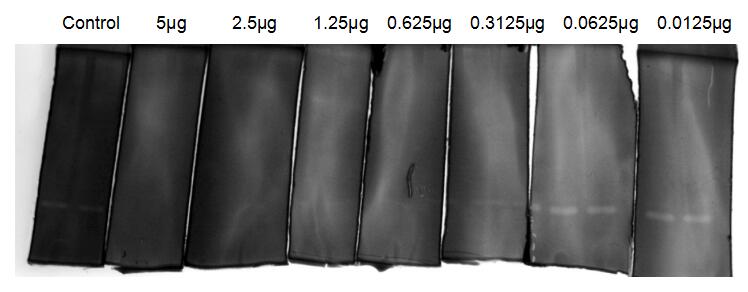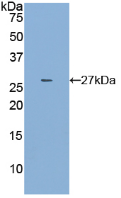Active Tissue Factor Pathway Inhibitor 2 (TFPI2) 

PP5; Placental protein 5
- UOM
- FOB US$ 324.00 US$ 810.00 US$ 1,620.00 US$ 4,860.00 US$ 12,150.00
- Quantity
Overview
Properties
- Product No.APB940Mu01
- Organism SpeciesMus musculus (Mouse) Same name, Different species.
- ApplicationsCell culture; Activity Assays.
Research use only - DownloadInstruction Manual
- CategoryHematologyCardiovascular biology
- Buffer Formulation20mM Tris, 150mM NaCl, pH8.0, containing 1mM EDTA, 1mM DTT, 0.01% SKL, 5% Trehalose and Proclin300.
- Traits Freeze-dried powder, Purity > 95%
- Isoelectric Point8.9
Sign into your account
Share a new citation as an author
Upload your experimental result
Review

Contact us
Please fill in the blank.
Activity test

Tissue Factor Pathway Inhibitor 2 (TFPI2) takes part in the regulation of plasmin-mediated matrix remodeling. Inhibits trypsin, plasmin, factor VIIa/tissue factor and weakly factor Xa. TFPI2 doesn’t have any influence on thrombin. TFPI2 also can inhibit MMP activity, which can hydrolyze gelatin under certain conditions. Thus, the activity of TFPI2 can be measured by inhibit MMP-2 hydrolyze gelatin. Gelatin zymography is mainly used for the detection of the gelatinases, 2μg/mL was denatured by SDS loading buffer, electrophoresed through sodium dodecylsulphate–polyacrylamide gel (SDS–PAGE; 8% gels) containing gelatin (1mg/mL) with nonreducing conditions. After renaturation, incubate with various concentrations of recombinant mouse TFPI2, then staining with coomassie brilliant blue G250, active MMP-2 would hydrolyze gelatin nearby, which was indicated by the white binds on the gel; if the activity of MMP-2 inhibit by TFPI2, there was none white binds on the gel.The result was shown in figure 1.
As the figure 1 shown, MMP-2 can be inhibited by recombinant mouse TFPI2 at least 2.5μg/mL.
Usage
Reconstitute in 20mM Tris, 150mM NaCl (pH8.0) to a concentration of 0.1-1.0 mg/mL. Do not vortex.
Storage
Avoid repeated freeze/thaw cycles. Store at 2-8°C for one month. Aliquot and store at -80°C for 12 months.
Stability
The thermal stability is described by the loss rate. The loss rate was determined by accelerated thermal degradation test, that is, incubate the protein at 37°C for 48h, and no obvious degradation and precipitation were observed. The loss rate is less than 5% within the expiration date under appropriate storage condition.
Increment services
-
 BCA Protein Quantification Kit
BCA Protein Quantification Kit
-
 Molecular Mass Marker for Protein
Molecular Mass Marker for Protein
-
 Monoclonal Antibody Customized Service
Monoclonal Antibody Customized Service
-
 Polyclonal Antibody Customized Service
Polyclonal Antibody Customized Service
-
 Protein Activity Test Experiment Service
Protein Activity Test Experiment Service
-
 Electrophoretic Mobility Shift Assay (EMSA) Experiment Service
Electrophoretic Mobility Shift Assay (EMSA) Experiment Service
-
 Buffer
Buffer
-
 Lentivirus Packaging Experiment Service
Lentivirus Packaging Experiment Service
-
 Adenovirus Packaging Experiment Service
Adenovirus Packaging Experiment Service
-
 Real Time PCR Experimental Service
Real Time PCR Experimental Service
-
 Spike RBD Protein (S-RBD)
Spike RBD Protein (S-RBD)
-
 Protein G
Protein G
-
 Protein A
Protein A









